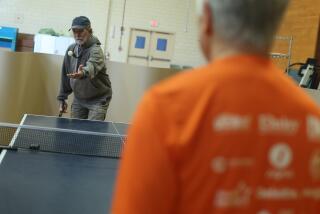Suicides of Marines Up Sharply in ’93 : Military: Total of 20 in 4 1/2 months nearly matches that for all of 1992. Reasons vary, but officials say some may be a result of members being barred from re-enlisting in a downsized corps.
- Share via
CAMP PENDLETON — Alarmed by a sharp increase in suicides throughout the U.S. Marine Corps, base officials hosted a suicide awareness workshop Wednesday for senior officers and enlisted men who are looking for ways to prevent any further deaths of their fellow Marines.
Twenty Marines have killed themselves nationwide since Jan. 1, a spokesman in Washington said. Seven of the deaths--more than one-third--occurred at Camp Pendleton and involved young men ranging in age from 20 to 29.
To date this year, the total number of suicides nearly matches the total for all of 1992, when 24 Marines died by their own hands. In 1991, suicides numbered 25.
Officials said 18 of the victims died from gunshot wounds and two hanged themselves.
Base commander Maj. Gen. B. Don Lynch said frustrated Marine officials are grappling for answers for the rising number of suicides. He and other officials said the reasons for the deaths may be as varied as the individuals who took their lives.
Lynch and other Marines at the two-hour workshop did say, however, that some of the deaths may have resulted because the victims were told they could not re-enlist in the shrinking Marine Corps. Base officials were unable to say how many of the seven local victims were being forced out of Camp Pendleton, which last year reported only one suicide.
Staff Sgt. Kelley Ramsey, base spokeswoman, said one victim killed himself after he was passed over for promotion and another Marine took his life after getting an unsatisfactory fitness report, which could have hurt his chances for promotion or re-enlistment.
The most recent suicide victim at the base was Capt. Peter A. Tkach, 29, who shot himself last Friday. Tkach was passed over for promotion to major and was the only officer to take his own life thus far in 1993. When denied promotion, servicemen can be booted out of the military.
Lynch told about 100 Marines gathered at the workshop that suicide is a “leadership problem that can be fixed.” He told the group, which included many who have spent more than two decades in the corps, they must recognize that young Marines between the ages of 20 and 24 are the most vulnerable to suicide and need special attention.
“We as leaders need to do all we can to integrate these young Marines,” Lynch said. “They have to be integrally involved in what we do, where we go and what we say.”
Lynch and other speakers told veteran Marines they would have to change old habits ingrained in them by tradition in order to tackle the suicide crisis.
For starters, 1st Marine Division psychiatrist Dr. Michael Johanek suggested that younger Marines should not be harassed or belittled with demeaning remarks because such comments can create low self-esteem.
“You need to know your people,” Johanek told a rapt audience. “If you don’t know your people, you can’t tell if they’re having problems.”
He blamed some of the suicides on the downsizing of the military and the emotional trauma suffered by a Marine when he is told he is not good enough to re-enlist in a leaner corps that aims to retain its best and brightest troops.
“A lot of our young people haven’t planned to be anything else (but Marines), and the job market out there (in civilian life) isn’t very good,” Johanek said.
The feeling of rejection can lead to an emotional crisis from which a despondent Marine can see no escape but through suicide, he added.
Johanek said the military’s demand for perfection can also trigger suicidal tendencies in an individual who is constantly criticized for his mistakes and views himself as a failure.
“Some Marines are more talented and gifted than others. Some may look bad while trying very hard. Others seem to accomplish much with apparently little effort. Praise for the attempt can build a whole new sense of self-worth,” Johanek said.
Most attendees called the workshop helpful as they voiced concerns about the rising number of suicides.
“A workshop like this is good because if the senior officers don’t have a prevention program in their battalions, this can give them the incentive to start a program or improve an existing one,” said Chief Warrant Officer Randy Thomas.
Sgt. Major Michael Madero, who has spent almost 25 years in the Marines, said the rash of suicides among young Marines is another sign of how the corps has changed over the years.
“Most of it is because of society pressures. But I remember years ago when the suicide victims were usually old master sergeants or gunnery sergeants who were being forced to retire. I don’t ever remember young Marines committing suicide,” Madero said.
More to Read
Sign up for Essential California
The most important California stories and recommendations in your inbox every morning.
You may occasionally receive promotional content from the Los Angeles Times.













